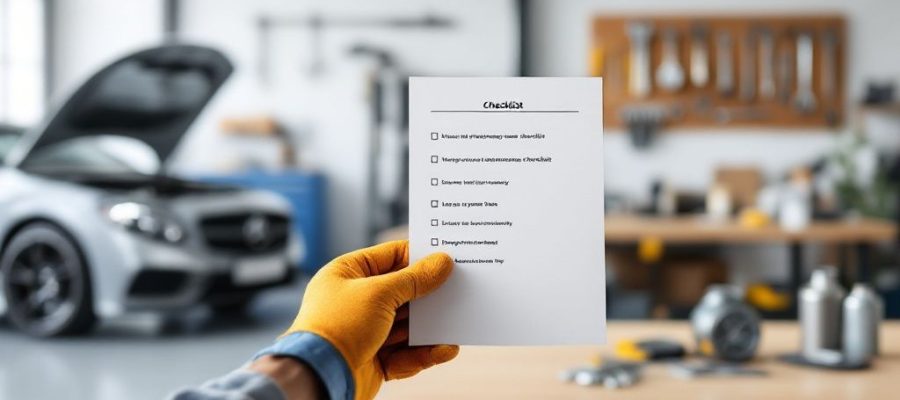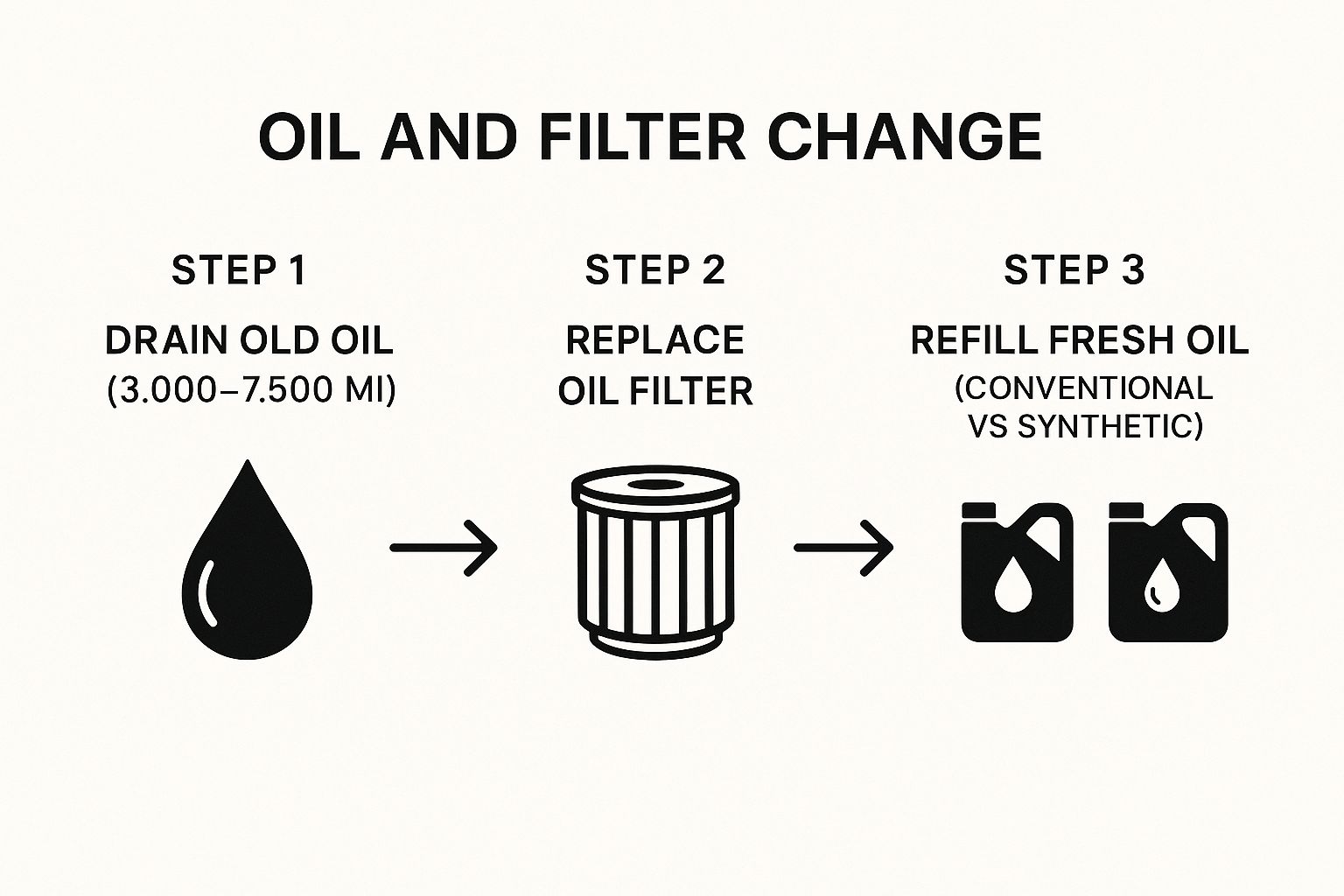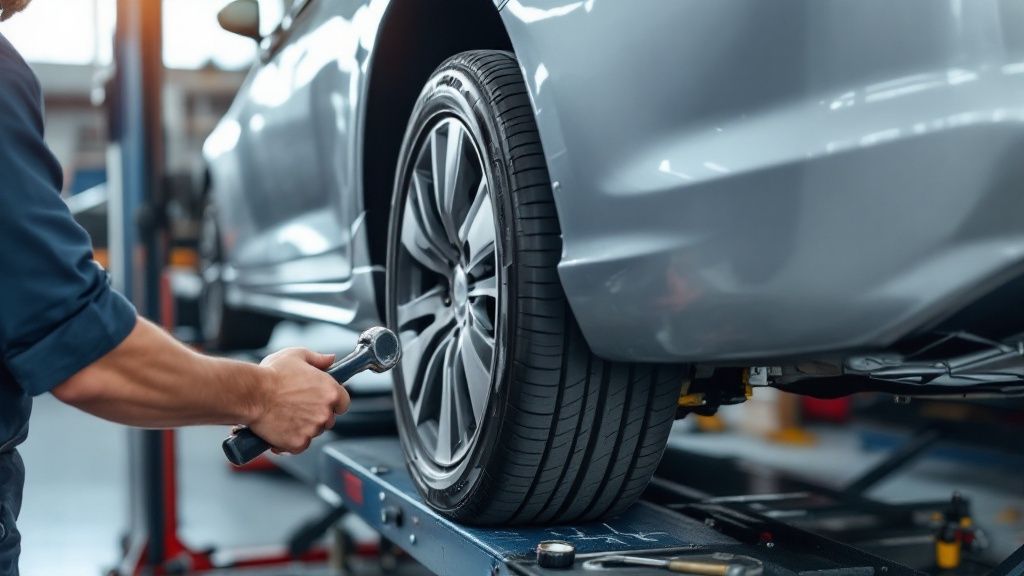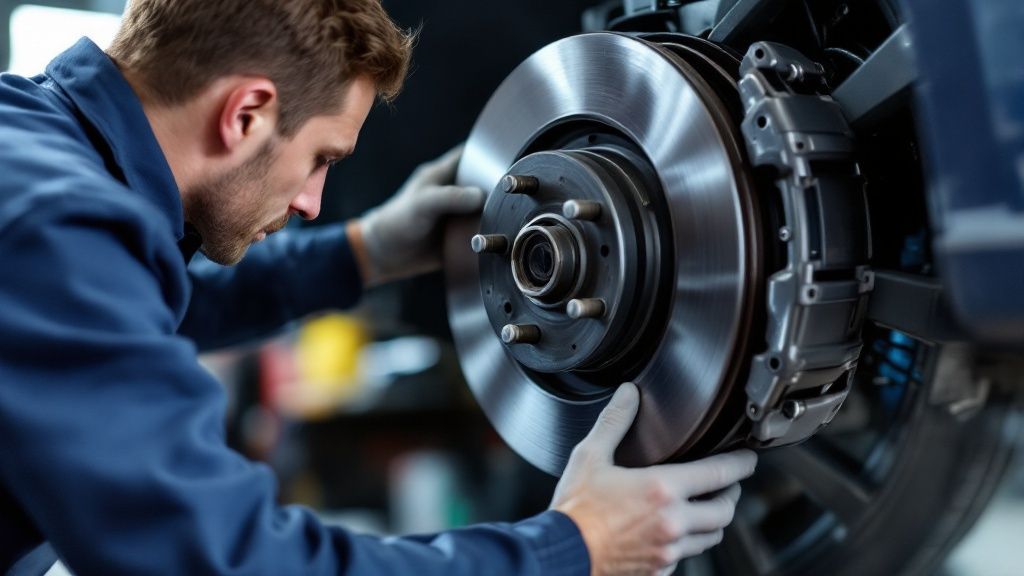
This car maintenance checklist printable covers seven essential tasks to maximize your vehicle's lifespan, performance, and safety. From oil changes and tire rotations to brake inspections and fluid checks, this concise list, paired with our printable checklist, helps you stay organized. Proper maintenance saves you money and prevents breakdowns, crucial for busy Mesquite commuters, military personnel, first responders, families, and professionals alike. Following these guidelines ensures your car remains reliable on the road.
Regular oil and filter changes are arguably the most critical maintenance task for any vehicle and deserve a prominent place on any car maintenance checklist printable. Engine oil performs several vital functions, including lubricating moving parts, reducing friction, absorbing heat, and carrying away contaminants. Over time, oil degrades, becoming less effective and potentially harming your engine. This is why adhering to a regular oil change schedule is essential for prolonging engine life and ensuring optimal performance. This is especially important for Mesquite commuters, military personnel, first responders, healthcare workers, families, busy professionals, students, and small business owners who rely on their vehicles daily.

The infographic below details the process of an oil change, highlighting key steps for successful implementation.

As the infographic demonstrates, a typical oil change involves several crucial steps starting with warming up the engine, then draining the old oil, replacing the oil filter, and finally, refilling with fresh oil. The proper sequence ensures complete removal of old, contaminated oil and prevents debris from entering the new oil.
An oil change typically involves draining the old oil, replacing the oil filter, and refilling with fresh oil. This process should be performed every 3,000-7,500 miles for conventional oil and potentially longer for synthetic blends or full synthetic oils, depending on the vehicle manufacturer's recommendations. Check your owner's manual or consult a qualified mechanic for the specific interval recommended for your car. Different oil types offer varying levels of protection and longevity; conventional oil is the most basic, while full synthetic oil provides superior performance and longer-lasting protection. This is particularly beneficial for those in Mesquite dealing with extreme temperatures.
Features of a proper oil change service:
Pros:
Cons:
Examples:
Tips for Oil Changes:
Companies like Jiffy Lube, Mobil 1 (popularizing synthetic oil), and Castrol have contributed to the awareness and accessibility of oil change services and products. Including "oil and filter changes" in your car maintenance checklist printable ensures this vital task won't be overlooked.
Proper tire maintenance is a crucial part of any car maintenance checklist printable. It ensures optimal vehicle handling, traction, fuel efficiency, and most importantly, safety for Mesquite commuters, military personnel, first responders, healthcare workers, families, and busy professionals alike. This involves regular tire rotation, pressure checks, and thorough inspections for wear and tear. By prioritizing tire maintenance, you're investing in a smoother, safer, and more cost-effective driving experience.

Tire rotation is the practice of moving tires from one position on the vehicle to another, following a specific pattern. This promotes even wear across all four tires. Without regular rotation, tires on the drive axle wear out faster. Rotating your tires ensures they wear evenly, extending their lifespan and maintaining consistent performance and traction on the road. This is particularly beneficial for those in demanding professions like first responders and healthcare workers who rely on their vehicles for quick and safe travel.
Features of a Comprehensive Tire Maintenance Routine:
Pros of Regular Tire Maintenance:
Cons of DIY Tire Maintenance:
Examples of Tire Maintenance Best Practices:
Actionable Tips for Effective Tire Maintenance:
Why Tire Maintenance Deserves its Place on Your Checklist:
Tire maintenance is fundamental to vehicle safety, performance, and longevity. For everyone from Mesquite commuters and military personnel to families and small business owners with fleet vehicles, regular tire checks and rotations are essential for minimizing costs and maximizing safety on the road. Including it in your car maintenance checklist printable helps ensure this vital task isn't overlooked.
A critical component of any car maintenance checklist printable is the brake system. This system is your vehicle's primary safety feature, responsible for slowing and stopping your car, and requires regular inspection and maintenance to ensure optimal performance and prevent potentially dangerous failures. This involves checking various components, including brake pads/shoes, rotors/drums, brake fluid levels, and brake lines. Regular upkeep not only prevents costly repairs down the line but, more importantly, ensures your safety and the safety of your passengers.

The brake system uses friction to convert kinetic energy (motion) into heat, thereby slowing or stopping the vehicle. When you press the brake pedal, hydraulic pressure is applied to the brake calipers, which in turn squeeze the brake pads against the rotors (or shoes against drums in some cases). This friction slows the rotation of the wheels, bringing your vehicle to a stop. Over time, brake pads and rotors wear down, reducing their effectiveness. Brake fluid also degrades and can absorb moisture, which can lead to corrosion and reduced braking performance.
Features of a Thorough Brake Inspection:
Pros of Regular Brake Maintenance:
Cons of Brake Maintenance:
Examples of Brake System Variations:
Actionable Tips for Maintaining Your Brakes:
For Mesquite commuters, military personnel, first responders, families, busy professionals, and small business owners, maintaining your brakes is paramount. Including a brake system inspection in your car maintenance checklist printable ensures your safety and peace of mind. By understanding the components, function, and maintenance requirements of your braking system, you can contribute significantly to preventing accidents and maintaining the longevity of your vehicle. This proactive approach saves you money in the long run and provides crucial peace of mind on the road.
Air filter replacement is a crucial part of any car maintenance checklist printable, especially for Mesquite commuters, military personnel, first responders, healthcare workers, families, busy professionals, and fleet managers. This simple yet effective maintenance task ensures your engine breathes clean air, promoting optimal performance, fuel efficiency, and longevity. Ignoring your air filter can lead to reduced engine power, decreased fuel economy, and even costly repairs down the line.
Your vehicle actually uses two types of air filters: the engine air filter and the cabin air filter. The engine air filter prevents dust, debris, and contaminants from entering the engine, ensuring clean air for combustion. The cabin air filter cleans the air entering the passenger compartment, removing pollen, dust, and other allergens.
How it Works:
Air filters act as a barrier, trapping particulate matter while allowing sufficient airflow. As air passes through the filter, contaminants are captured in the filter media. Over time, the filter becomes clogged, restricting airflow and reducing engine performance. This is why regular replacement is essential.
Features and Benefits:
When and Why to Replace:
Pros and Cons:
Examples:
Actionable Tips:
Including air filter replacement in your car maintenance checklist printable ensures your vehicle runs smoothly, efficiently, and provides a healthy environment for you and your passengers. This simple maintenance task can significantly impact your vehicle's performance and longevity, making it a vital step for everyone from Mesquite commuters to busy professionals and fleet managers.
This crucial step in your car maintenance checklist printable ensures the longevity and smooth operation of your vehicle. Fluid level checks and replacements are essential for maintaining optimal performance and preventing costly system failures. Various fluids are vital for different systems within your car, and neglecting them can lead to significant problems down the road. This is especially important for Mesquite commuters, military personnel, first responders, healthcare workers, and busy professionals who rely on their vehicles daily. Even families with young children and small business owners will benefit from the peace of mind preventative maintenance provides.
How it Works:
Your car relies on several different fluids to function correctly. These include:
Each fluid has a specific lifespan and requires checking and replacement at different intervals. Regular checks, as part of your car maintenance checklist printable, help identify leaks or low fluid levels before they cause major issues.
Features and Benefits:
Pros:
Cons:
Examples:
Tips for Implementing Fluid Checks:
Why this Deserves a Place on Your Car Maintenance Checklist Printable:
Fluid level checks and replacements are a fundamental aspect of car maintenance. They are a proactive and cost-effective way to prevent major system failures, ensure optimal vehicle performance, and extend the life of critical components. By including this in your routine, you're investing in the long-term health and reliability of your vehicle, a valuable asset for all Mesquite drivers, including military personnel, first responders, healthcare workers, families, and busy professionals. Consistent adherence to this point in your car maintenance checklist printable offers considerable peace of mind and long-term savings.
A reliable battery is crucial for any vehicle, especially for Mesquite commuters, military personnel, first responders, healthcare workers, and busy professionals who depend on their cars daily. Battery maintenance and testing earns its place on this car maintenance checklist printable because it directly impacts a vehicle's starting reliability and the performance of essential electrical systems. Ignoring your battery can lead to unexpected breakdowns, missed appointments, and potentially dangerous situations. This section will outline the importance of battery care and how to perform basic checks.
Your car battery provides the electrical power needed to start the engine and operate various systems, from lights and radio to critical safety features. While modern batteries are often labeled "maintenance-free," they still require periodic inspection to ensure reliable performance and maximize their lifespan, which typically ranges from 3-5 years depending on climate, usage, and battery type. Factors like extreme Mesquite heat can significantly shorten a battery’s life.
How Battery Maintenance and Testing Works:
Battery maintenance involves checking for corrosion on the terminals, ensuring tight connections, and occasionally testing the battery's voltage output. Testing typically includes a voltage measurement to assess the battery's state of charge and a load test to determine its ability to deliver power under stress. Different battery types, such as flooded lead-acid, AGM (Absorbent Glass Mat), and lithium-ion, have specific maintenance requirements. For example, traditional flooded batteries may require checking the fluid levels in each cell, while AGM and lithium-ion batteries are sealed and require no such maintenance.
Examples of Successful Implementation:
Actionable Tips for Car Battery Maintenance:
Pros of Battery Maintenance:
Cons of Battery Maintenance:
By incorporating battery maintenance and testing into your car maintenance checklist printable, you can avoid inconvenient breakdowns, ensure the reliable operation of your vehicle's electrical systems, and extend the life of your battery. This is particularly important for Mesquite drivers facing extreme temperatures and for those whose professions demand unwavering vehicle reliability.
Belt and hose inspection is a crucial part of any car maintenance checklist printable, especially for Mesquite commuters, military personnel, first responders, healthcare workers, families, busy professionals, and small business owners who rely on their vehicles daily. This inspection focuses on the belts and hoses that transfer power and fluids throughout your engine, ensuring its smooth and efficient operation. Neglecting these components can lead to unexpected breakdowns, expensive repairs, and potentially catastrophic engine damage. This is why regular checks deserve a prominent place on your car maintenance checklist.
How it Works:
The serpentine belt, a single continuous belt, powers multiple engine accessories like the alternator, power steering pump, and air conditioning compressor. Other belts may drive the water pump or, in some older vehicles, individual accessories. Hoses, on the other hand, transport essential fluids like coolant, power steering fluid, and brake fluid. Regular inspection of these components involves visually checking for signs of wear and tear, as well as testing hoses for firmness and proper connection.
Features and Benefits:
Pros:
Cons:
Examples:
Actionable Tips for Your Car Maintenance Checklist Printable:
Why this Matters for You:
Whether you’re a commuter battling Mesquite traffic, a first responder needing a reliable vehicle, or a busy parent juggling family schedules, a well-maintained car is essential. By including belt and hose inspection in your car maintenance checklist printable, you’re taking a proactive step towards preventing costly repairs and ensuring your vehicle's dependability. This simple check can save you time, money, and the hassle of unexpected breakdowns.
| Maintenance Task | Implementation Complexity 🔄 | Resource Requirements 💡 | Expected Outcomes 📊 | Ideal Use Cases 💡 | Key Advantages ⭐ |
|---|---|---|---|---|---|
| Oil and Filter Changes | Moderate – requires tools & disposal | Moderate – oil, filter, tools | Prolongs engine life, improves fuel efficiency | Routine engine upkeep every 3,000-7,500 miles | Extends engine life, reduces emissions |
| Tire Maintenance and Rotation | Moderate – needs jack, wrenches | Moderate – pressure gauge, lug wrench | Extends tire life, improves safety and fuel economy | Regular tire rotation every 5,000-8,000 miles | Enhances traction, smoother ride |
| Brake System Inspection | High – requires knowledge & tools | High – specialized tools, brake fluid | Ensures safety, prevents failure, consistent braking | Critical safety checks every 6,000 miles | Prevents brake failure, costly repairs |
| Air Filter Replacement | Low – simple DIY task | Low – replacement filters, screwdriver | Improves fuel economy, engine life, cabin air quality | Easy maintenance every 15,000-30,000 miles | Quick, inexpensive, improves air flow |
| Fluid Level Checks and Replacement | Moderate – some fluids need tools | Moderate to high – various fluids, tools | Prevents system failures, maintains performance | Periodic checks of coolant, transmission, brake fluids | Prevents expensive damage, easy checks |
| Battery Maintenance and Testing | Moderate – needs testing tools | Moderate – multimeter, cleaning supplies | Prevents start failures, prolongs battery life | Battery checks every few years or before seasons | Identifies issues early, improves efficiency |
| Belt and Hose Inspection | Moderate to high – visual & manual | Low to moderate – basic tools, replacements | Prevents breakdowns, costly engine damage | Frequent inspection every 3,000 miles or 3 months | Prevents catastrophic failures |
From regular oil changes and tire rotations to brake inspections and fluid top-offs, staying on top of your car's maintenance is crucial. By prioritizing the seven key areas covered in this article—oil and filter changes, tire maintenance, brake system upkeep, air filter replacement, fluid checks, battery maintenance, and belt/hose inspections—you're not just extending the life of your vehicle, you're also ensuring a safer and more reliable driving experience. A well-maintained car performs better, consumes less fuel, and avoids costly repairs down the road. This is especially important for Mesquite commuters, military personnel, first responders, busy professionals, and families who rely on their vehicles daily.
For a more comprehensive guide to car maintenance, including helpful tips and detailed explanations, check out this resource: The Ultimate Car Maintenance Checklist. It provides a deeper dive into these essential maintenance tasks. Remember, a printable car maintenance checklist is your best friend! Download our car maintenance checklist printable and keep it handy in your glove compartment for quick reference.
Mastering these simple yet powerful maintenance practices offers invaluable peace of mind, knowing your vehicle is ready for anything. Hit the road with confidence, knowing you’ve taken the necessary steps to ensure a smooth and safe journey. Ready to simplify your car maintenance routine? Kwik Kar of Mesquite can handle all your car maintenance needs, from oil changes to comprehensive inspections. Visit Kwik Kar of Mesquite today to schedule your appointment and experience the Kwik Kar difference!